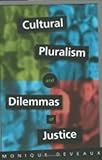Cultural Pluralism and Dilemmas of Justice / Monique Deveaux.
Material type: TextPublisher: Ithaca, NY : Cornell University Press, [2018]Copyright date: 2000Description: 1 online resource (224 p.)Content type:
TextPublisher: Ithaca, NY : Cornell University Press, [2018]Copyright date: 2000Description: 1 online resource (224 p.)Content type: - 9781501723759
- 305.8 23
- JC574 .D478 2000eb
- online - DeGruyter
| Item type | Current library | Call number | URL | Status | Notes | Barcode | |
|---|---|---|---|---|---|---|---|
 eBook
eBook
|
Biblioteca "Angelicum" Pont. Univ. S.Tommaso d'Aquino Nuvola online | online - DeGruyter (Browse shelf(Opens below)) | Online access | Not for loan (Accesso limitato) | Accesso per gli utenti autorizzati / Access for authorized users | (dgr)9781501723759 |
Browsing Biblioteca "Angelicum" Pont. Univ. S.Tommaso d'Aquino shelves, Shelving location: Nuvola online Close shelf browser (Hides shelf browser)

|

|

|

|

|

|

|
||
| online - DeGruyter Spirits and Clocks : Machine and Organism in Descartes / | online - DeGruyter A Politics of Impossible Difference : The Later Work of Luce Irigaray / | online - DeGruyter Enigmas : Essays on Sarah Kofman / | online - DeGruyter Cultural Pluralism and Dilemmas of Justice / | online - DeGruyter The Political Economy of the New Asian Industrialism / | online - DeGruyter China's Quest for National Identity / | online - DeGruyter Industrial and Labor Relations Terms : A Glossary / |
Frontmatter -- Contents -- Acknowledgments -- Introduction -- 1. Difference and Diversity in Liberal and Democratic Thought -- 2. Toleration and Respect -- 3. Neutrality, Justice, and Cultural Diversity -- 4. Cultural Pluralism from Liberal Perfectionist Premises -- 5. Deliberative Democracy: A Theory of Pluralism and Inclusion? -- 6. Toward a Deliberative Liberalism? -- 7. The Dilemma of Cultural Diversity in Political Thought -- Bibliography -- Index
restricted access online access with authorization star
http://purl.org/coar/access_right/c_16ec
How should democratic societies define justice for cultural minority groups, and how might such justice be secured? This book is a nuanced and judicious response to a critical issue in political theory—the challenge of according equal respect and recognition to minority groups and accommodating their claims for special cultural rights and arrangements.Monique Deveaux contends that liberal theorists fail to grant enough importance to identity and the content of cultural life in their attempts to conceive of political institutions for plural societies. She takes to task the spectrum of theories on pluralism, from weak and strong theories of tolerance through neutralist liberalism to comprehensive liberalism, and finally to arguments for deliberative politics that build on Jürgen Habermas's discourse ethics. The solution proposed here is "deliberative liberalism," which incorporates both critically reconceived principles of deliberative democracy and central liberal norms of consent and respect. Cultural conflicts in democratic societies include clashes involving Aboriginal peoples, ethnic and linguistic minorities, and recent immigrant groups in Europe, North America, and Australia. Drawing on examples from several countries, Deveaux concludes that genuine respect and recognition for cultural minorities requires full inclusion in existing institutions and the right to help shape the political culture of their own societies through democratic dialogue and deliberation.
Mode of access: Internet via World Wide Web.
In English.
Description based on online resource; title from PDF title page (publisher's Web site, viewed 26. Aug 2024)


